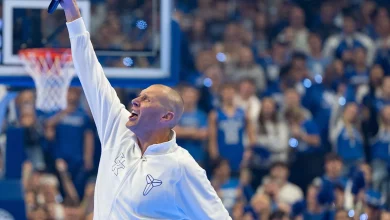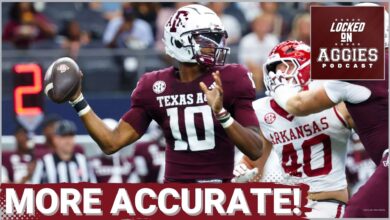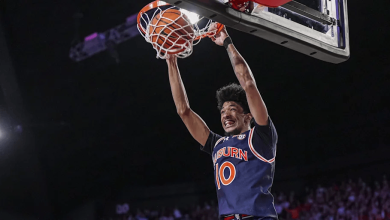Notre Dame football coach Marcus Freeman talks current transfer rules: ‘That’s not real life’

In the ever-evolving landscape of college football, one of the most debated topics in recent years has been the transfer portal. Designed to allow student-athletes the freedom to transfer between programs without sitting out a year, it was initially heralded as a step toward player empowerment. However, as the portal has become more widely used, it has led to a number of unforeseen consequences, some of which have raised concerns about the impact on the integrity of college football.
For Notre Dame head coach Marcus Freeman, a former player and now the leader of one of college football’s most storied programs, the new transfer rules have become a focal point of his concerns. Freeman has always been an advocate for student-athletes, and while he understands the importance of freedom and mobility in their college careers, he has also expressed reservations about how the current transfer landscape is being handled. Freeman has been outspoken in his belief that the current rules are creating a scenario that, in his words, “isn’t real life.”
His comments, made during a press conference after a spring practice session, highlighted the growing tension between college football’s push for professionalization and the traditional ideals that the sport has long represented. In a world where athletes now have the ability to leave their teams at any time, chasing new opportunities or financial incentives, Freeman is grappling with the consequences on both the team dynamics and the broader culture of college sports. His statement, “That’s not real life,” speaks to a larger issue: the struggle to balance freedom and fairness in a system that continues to blur the lines between amateurism and professionalism.
In this article, we will explore Marcus Freeman’s thoughts on the current transfer rules, the impact of the transfer portal on college football, and the deeper philosophical and practical implications of these changes. Additionally, we will examine how Notre Dame, under Freeman’s leadership, is navigating this new era of college football while staying true to its values.
The Transfer Portal: A Game-Changer in College Football
The NCAA’s implementation of the transfer portal in 2018 was seen as a revolutionary step for student-athletes. Prior to this rule change, athletes who wished to transfer had to go through a cumbersome process that often involved restrictions and, in many cases, the penalty of sitting out a season. The new rule removed these barriers, allowing athletes to explore new opportunities without facing penalties. With this newfound freedom, the transfer portal has seen an influx of athletes exploring options at other schools, with many choosing to transfer multiple times throughout their college careers.
However, while the transfer portal was designed to give student-athletes more freedom, it has not come without controversy. One of the primary criticisms is that it has led to a “free agency” culture within college football, where players frequently change schools for various reasons, ranging from playing time and coaching changes to the allure of NIL (Name, Image, and Likeness) deals. Critics argue that this has undermined the stability and integrity of college programs, where team chemistry, loyalty, and commitment once took precedence over individual ambition.
From Freeman’s perspective, this shift is problematic. As a former linebacker who played at Ohio State and later transitioned into coaching, Freeman understands the importance of loyalty, team-building, and developing a long-term vision. In his view, the constant churn of players through the transfer portal has made it harder to maintain these ideals. While he acknowledges that players should have the ability to make choices that are best for their futures, Freeman believes that the current system is too focused on individualism, rather than the team-oriented mindset that has long defined college sports.
“I’m all for players having opportunities to better themselves,” Freeman explained in his remarks. “But when you have a system where kids are constantly jumping from school to school, it doesn’t promote the kind of stability that I believe is necessary for success—not just on the field, but in life. That’s what’s missing right now—the long-term vision and commitment that come with sticking it out through tough times.”
The Impact on Team Dynamics and Culture
One of Freeman’s key concerns about the transfer portal is how it impacts the overall dynamics of a football team. College football teams are often built around a sense of unity and cohesion. The relationships that players develop with one another, particularly in practices and games, are essential to creating a winning culture. When players are constantly leaving or joining the team, it can disrupt the stability of the roster and make it harder to establish those relationships.
At Notre Dame, Freeman has worked tirelessly to instill a sense of unity and family among his players. As someone who has played the game, Freeman knows that success in college football is built on trust, mutual respect, and understanding. When players leave mid-season or join new teams in hopes of more playing time or a better NIL deal, it can cause a rift in the locker room, creating an atmosphere of uncertainty and instability.
“Football is about building relationships and learning how to trust your teammates,” Freeman continued. “If you’re constantly worrying about whether someone is going to leave, how can you develop that trust? How can you build the kind of culture that leads to success on the field?”
In this sense, Freeman is advocating for a return to the fundamentals of college football—where a commitment to a program, a coach, and teammates is valued over personal gain. He’s not suggesting that players shouldn’t have the ability to transfer, but rather that the freewheeling nature of the current system has created an environment where players may be more likely to abandon their commitments at the first sign of adversity. This, in Freeman’s view, is antithetical to the values that have made college football such an enduring and beloved sport.
The Role of NIL in the Transfer Landscape
Another complicating factor in the transfer portal’s current iteration is the rise of NIL deals. The introduction of NIL rights in 2021 allowed college athletes to profit from their name, image, and likeness, opening up new revenue streams for student-athletes. While NIL has been a significant step forward in compensating athletes for their work, it has also introduced new challenges, particularly when it comes to recruitment and retention.
For many athletes, the opportunity to earn money through NIL deals has become a major factor in their decision to transfer. Programs that can offer lucrative endorsement deals are attracting top talent, and for some, it may be the deciding factor in whether they stay or leave a school. While Freeman acknowledges the importance of NIL in the modern landscape, he also sees its potential to further erode the team-first mentality that is essential to building a successful program.
“The thing about NIL is that it’s a great opportunity for these kids to capitalize on their talents,” Freeman said. “But I think it also opens up a situation where players are more likely to make decisions based on financial reasons or what’s best for them personally, rather than the good of the team. When you throw money into the equation, you get even more distractions.”
Freeman is not alone in his concerns about the intersection of NIL and the transfer portal. Many coaches have voiced similar worries, suggesting that the two factors combined have created a system where players are more focused on personal gain rather than the collective success of the team. For programs like Notre Dame, which values tradition, stability, and academic excellence, this shift is particularly troubling.
A Call for Change: What Freeman Wants to See
Despite his concerns, Freeman has made it clear that he’s not opposed to the transfer portal or NIL. He understands the realities of the modern college football landscape and recognizes that change is inevitable. However, he believes that the system needs to be adjusted in a way that encourages stability and commitment while still allowing players the freedom to make decisions that are in their best interests.
“I think we need to find a balance,” Freeman remarked. “The transfer portal and NIL can work, but it needs to be done in a way that respects the game and the values that make college football so special. It’s about creating a system that doesn’t just reward players for jumping from school to school, but instead encourages them to build something long-term, to develop relationships and character that will serve them beyond football.”
For Freeman, this balance is essential in maintaining the integrity of college football. He is calling for a more structured approach to transfers, one that discourages frequent movement and promotes a culture of loyalty and commitment. Additionally, Freeman believes that NIL should be used as a tool for empowerment, but not as a primary motivator for athletes to change teams or abandon long-term goals. Marcus Freeman’s comments about the transfer portal and its implications for college football reflect a deeper concern about the direction in which the sport is heading. While the changes in college football have undoubtedly created new opportunities for players, Freeman is cautioning against the erosion of the values that have made the sport great—teamwork, loyalty, and commitment.
As Notre Dame continues to navigate the challenges of recruiting in this new era, Freeman remains dedicated to finding a way to balance the evolving landscape with the core principles of the game. His candid observations about the current transfer rules and NIL demonstrate a keen understanding of the pressures facing today’s student-athletes, and his commitment to creating a stable and unified program is a testament to his leadership.
Whether the NCAA will make changes to the current transfer rules remains to be seen, but Freeman’s voice adds an important perspective to the ongoing conversation about the future of college football. As the sport continues to evolve, it will be important to strike a balance between the empowerment of players and the preservation of the values that make college football one of the most cherished traditions in American sports.









